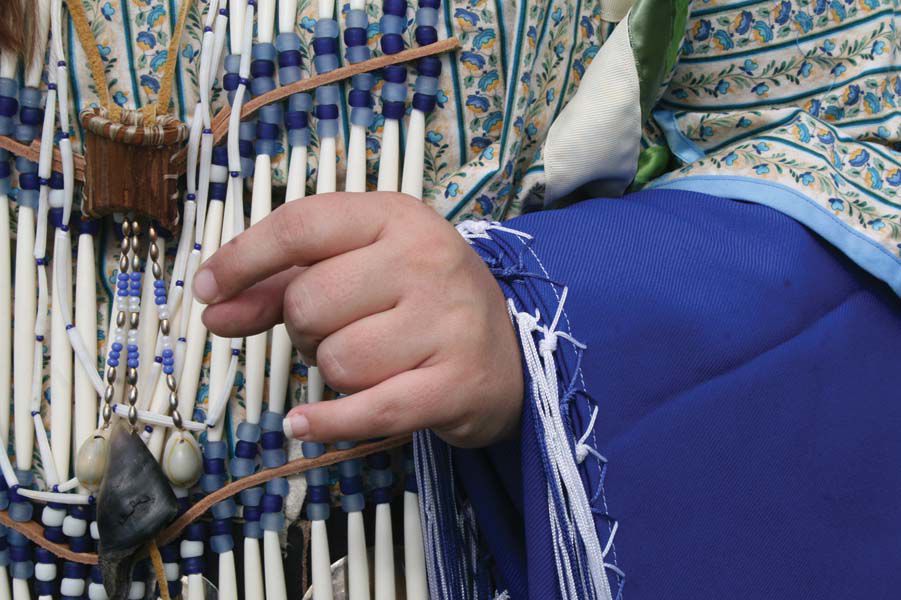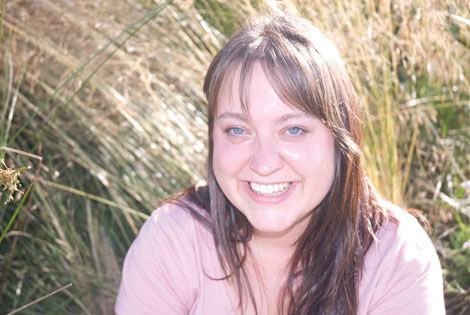Story & Photos by Stephanie Reyes
Sitting in a shaded spot outside of the UO’s Museum of Natural and Cultural History, senior Stephanie Wood breathes in and sighs. “It’s good to be home!” she says. Wood recently returned from an internship at the Smithsonian Institute of the national museum of the American Indian. Wood is a member of the Confederated Tribes of Grand Ronde, which includes twenty-seven bands of federally recognized Native American tribes. But as the face of Grand Ronde youth, Wood does not “look the part.”
Blue-eyed and fair-haired, Wood is a testament against stereotypes. And while her heritage may be hard to guess at first glance, as soon as she begins talking about her involvement in the Native American community, it becomes apparent.
Wood has recently completed a degree in cultural anthropology with an emphasis on Northwest Native American Cultures. As an undergraduate student, she worked as a tour guide at the Museum of Natural and Cultural History before helping catalogue over 350 baskets from the Northwest with the Western Oregon Basket Project.
But she shrugs off these problems as misconceptions on how Native Americans are perceived.
Upon graduation this past summer, she departed for another internship in Pendleton, Oregon, at the Tamástslikt Cultural Institution on the Confederated Tribes of the Umatilla Indian Reservation.
She hopes that upon completion of her second internship that she will go on to work in the cultural department for Grand Ronde, or possibly in a museum.
As for Stephanie Wood, her multicultural background has helped her gain an appreciation for traditions and values, and an ability to educate others through her experiences.
When did you realize that you were Native American?
I was really young. I grew up on a farm in Amity, Oregon, and every weekend we would travel 25 minutes to the Grand Ronde reservation. We would visit Grandma and I would hang out with my friends. It was instilled from the time I was born, but we didn’t really talk about it.
Why didn’t you talk about it?
I went to a very small, white school and my mom told me not to discuss it. We never learned about Native Americans, which is odd since Grand Ronde is one of the biggest tribes in Oregon and is located next to Amity.
Why do you think she gave you those instructions?
My two brothers, another student, the school mascot, and I were the only Native Americans there. There was only a few other students who were ethnically diverse. Everyone else was … white.
How did you learn about your culture then?
My Grandma and other elders in the family would tell me stories to fill in the gap the public system had created. We learned about the Oregon Trail, and Christopher Columbus, but nothing on Native people.
Did your peers know you were Native, or did they think you were white?
I think a lot of people knew I was Native, but there was a time when I was in third or fourth grade and a teacher had noticed I marked the ‘Native American’ box on a state assessment and told me that I was not Native American, and that I should re-mark it as ‘white’.
Have you felt outcasted by members of the Grand Ronde community?
Yes. A main reason is because I never really lived in Grand Ronde. People who live there are more accepted than those who live off the reservation. People who live off the reservation are different.
Many people who live on the reservations haven’t had as many opportunities as I have had—my education, my internships so I am viewed slightly different because my life branched out. I didn’t get stuck there like many other people.
Was there a time when you wished you were darker?
When I was born I had blonde hair and blue eyes. My older brother Chris looked like the stereotypical Native American. He had darker skin and hair while my little brother looks like me.
Until high school, I wished I was darker until I realized Native Americans come in all different shapes, colors, and sizes.
Do you feel defined by the color of your skin?
Yes. When I first arrived at the University of Oregon, I remember watching the flood of students between classes. There were more students than I had ever seen in my life. I chose U of O because of the Chinuk Wawa language program. The language was originally used by the tribe and developed into a trade language, so that people could communicate when trading with other natives.
When I went to the Native American Student Union and the members rejected me, I thought twice about my college decision. They looked at me like I was some white girl who was bothering them and so I was ignored. I called my mom crying and told her that I didn’t belong at the U of O.
How did you work all of that out?
I just kept to myself and didn’t get involved for more than two years. I started coming to culture night at the Long House and hung out with individuals in the group. Some of the people who originally rejected me either got to know me or graduated and were no longer involved.
I am proud that I have never had to convince others I was native and I knew eventually everything would fall into place.
Have your siblings had any effect on your identity?
My brothers and I never really talked about it. In my family children were seen and not heard. When my older brother Christopher died something inside me awoke.
How did Christopher’s death affect you and your family?
He passed away when he was 23 years old. I was 13. David was nine. His death is still hard on our family.
He had Wilson’s disease, which means he had too much copper in his blood. It is a very rare disease and doctors thought it was something else.
I now participate in annual genetic testing. His death has focused that we Natives are still here. It’s made me want to focus my energy and work harder rather than living the way I had previously. My life began to have a purpose.
How did your life change?
I became more on my own. My parent’s changed their child-rearing techniques and weren’t as involved as they had been. My family fell apart. I felt as though I had to take on the part as a role model for my younger brother, and I tried harder in school. I wanted to show others that I wasn’t weak. After Chris’ death, I grew up fast.
Where does your family come from?
We can trace my mother’s lineage back to Grand Ronde’s treaty signers, and my dad is Scottish/Irish/French. My dad comes from a long line of farmers and his ancestors traveled to Oregon on the Oregon Trail.
I have cousins of the same generation who are really dark, and other cousins who are redheads! They are so light that they need SPF 100! Yet they are native too. That cousin’s mother has really dark eyes and long black hair. Genetics are a funny thing.
Why were you raised off the reservation?
My parents wanted to give me a different life than one I would have had on the reservation. I would have loved to have been more involved in the youth programs that are available, but I understand why they chose not to. They didn’t want us to become wrapped up in problems that ail the native community like alcoholism and drug use.
I really got to live a better life, well, maybe not better, but different in a good way.
What does the future of Grand Ronde look like?
In Grand Ronde, blood quantum (a predetermined amount of lineage to enroll in a tribe) is a big ordeal. Today many natives marry non-natives.
There are benefits being enrolled in a tribe and if you can prove your lineage, you should. There are a lot of people of mixed decent in Grand Ronde and so there is a wide range of appearances. I would be happy marrying a non-native person, but I would hope they would support my culture and me.
How do you help expand Grand Ronde culture outside of the tribe?
By talking with as many community members and non-GR tribal members and educating them on our culture. By working at Native museums I can help educate others about our heritage and culture.
What do you hope to accomplish through your involvement with the Native community?
I hope to keep the culture alive. We are still here. We do not appear as we do in mass media.
Native Americans are still living a contemporary life, just like many other people.
Categories:
Blue Eyes, Native Blood
January 21, 2010
0









